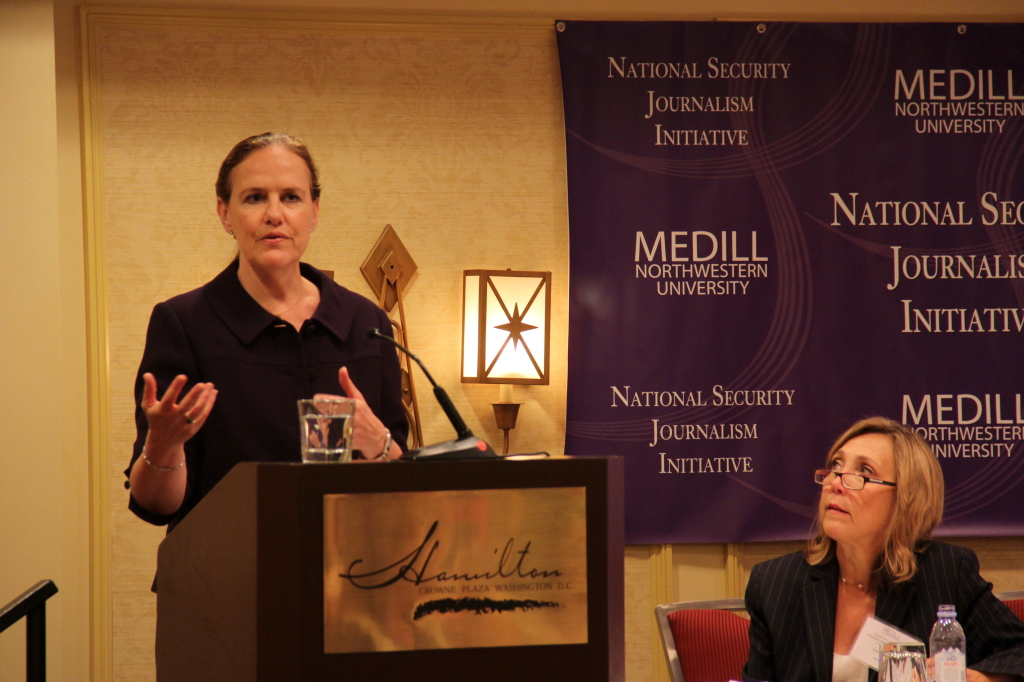
Center for a New American Security CEO Michelle Flournoy addresses journalists at the Medill National Security Journalism Initiative Conference, emphasizing the importance of careful, in-depth reporting.
WASHINGTON – Americans need a deep understanding of the generational battles going on in Islam today as the jihadist group Islamic State seeks to establish itself more deeply in Syria and Iraq, and journalists need to help provide that understanding, according to Center for a New American Security CEO Michelle Flournoy.
Addressing the Medill National Security Journalism Initiative Conference in early October, the former defense undersecretary for policy emphasized the need for reporters to carefully understand and convey the historical precedence of any conflict or event.
“These are generational battles (in Islam) that will be playing out for quite some time. We need to understand ideologies and get beyond superficial manifestations because manifestations may change but the causes will stay the same, which is why it’s important to understand them,” she said.
Army Col. Steve Warren, director of Defense Press Operations, offered similar advice to journalists in terms of understanding Defense Department operations. He said that it is crucial for reporters to explain the complexities of military operations. To get the information needed to do that job, they must build trust and relationships with their sources at the Pentagon.
“If you put in the effort to meet me in person and I have a face to a name, I am much more likely to respond when you contact me again,” he said. “Our job here is really to help you.”
But reporters said it’s hard to reach press officials in the Pentagon, to which Warren responded that persistence is the most effective strategy.
Andrew Becker, border and national security reporter for the Center for Investigative Journalism, agreed that patience is key to earning a source’s trust, especially when veering into sensitive information in national security matters.
“You can’t just jump in and download a person’s brain,” he said in a telephone interview. “It takes time and patience to put people at ease. It’s about treating them with respect. You’re interrupting someone’s day and asking them to give you their time, so the least you can do is to be respectful and understand that it’s not always in their best interest to talk to you.”
Though journalists should try to get all interviews on the record, Becker said that sometimes it is important to give sources “time to warm up to you and get to know you” in an off-the-record interview.
Warren and Becker noted that sometimes both the Pentagon and the press withheld information from the public to preserve national security interests. Becker said that is exactly why a positive press and government relationship can only be maintained if both parties understand their common responsibility to serve the public.
“There has to be a mutual understanding that if you’re a government official or a member of the press, you are answering to the public as an elected official and because of your right to report on behalf of the people,” Becker said.
“The nature of the relationship can be adversarial, but taking the time to engage with someone on a human level and getting face to face can definitely help lower those barriers, if not break them.”
The three essentials of reporting from Tom Bowman, NPR’s Pentagon correspondent:
- First, know your subject. Get as much detail as possible from trusted sources, both human and documents.
- Finely hone your questions. Don’t ask a military officer a diplomatic question, or a diplomat a military question. Ask simple, direct and thoughtful questions they can’t brush aside.
- And sources, sources, sources. That’s what reporting is all about.
A word of advice from Anne Gearan, The Washington Post’s political correspondent:
“Reporters working in Washington face a constant challenge to break out of the circle of bland official comment and to break into what I call the circle of truth. Not circle of trust, because the relationship between reporters and government sources will not and should not always equal trust. It should equal respect and a clear understanding of the other’s responsibilities. My main advice for reporters dealing with the federal government is to do your homework, know your beat and develop a reputation for consistent and nuanced coverage. Always politely, insistently, ask for better than the laundered official quote that most press shops will try to give you. Ask for an interview, ask to speak to someone else, and of course, find those people inside the government who really know something and are brave enough to talk to reporters.”





